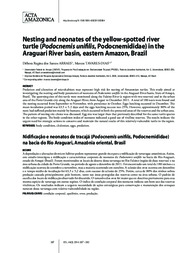Nesting and neonates of the yellow-spotted river turtle (Podocnemis unifilis, Podocnemididae) in the Araguari River basin, eastern Amazon, Brazil.
Nesting and neonates of the yellow-spotted river turtle (Podocnemis unifilis, Podocnemididae) in the Araguari River basin, eastern Amazon, Brazil.
Author(s): ARRAES, D. R. dos S.; TAVARES-DIAS, M.
Summary: Predation and alteration of microhabitats may represent high risk for nesting of Amazonian turtles. This study aimed at investigating the nesting and body parameters of neonates of Podocnemis unifilis in the Araguari River basin, State of Amapá, Brazil. The spawning sites of this turtle were monitored along the Falsino River (a region with two reserves) and in the urban area of the Porto Grande city along the Araguari River, from August to December 2011. A total of 180 nests were found and the nesting occurred from September to November, with prevalence in October. Eggs hatching occurred in December. The mean incubation period was 63.5 ± 5.2 days and the eggs hatching success was 25%. However, approximately 80% of the nests had suffered predation mainly by humans, which occurred in both the protected areas of the reserves and the urban area. The pattern of nesting site choice was discussed. Egg size was larger than that previously described for the same turtle species in the other regions. The body condition index of neonates indicated a good use of vitelline reserves. The results indicate the urgent need for strategic actions to conserve and maintain the natural stocks of this relatively vulnerable turtle in the region.
Publication year: 2014
Types of publication: Journal article
Unit: Embrapa Amapá
Keywords: Amazon, Amazonia, Chelonian, Condição corporal, Ovo, Predação, Quelônio, body condition, eggs, predation
Observation
Some of Embrapa's publications are published as ePub files. To read them, use or download one of the following free software options to your computer or mobile device. Android: Google Play Books; IOS: iBooks; Windows and Linux: Calibre.
Access other publications
Access the Agricultural Research Database (BDPA) to consult Embrapa's full library collection and records.
Visit Embrapa Bookstore to purchase books and other publications sold by Embrapa.

